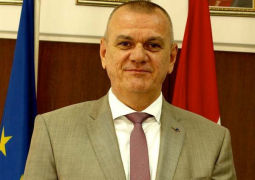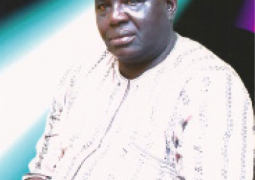The
Food and Agriculture Organisation (FAO) in collaboration with the Gambia
government, under the FAO Tele-Food Programme, yesterday donated fishing
materials and accessories to the Try Oyster association of Kartong.
The
materials included ten wooden fishing canoes, 200 life jackets, 150 boots (foot
wear) and 130 hand gloves worth up to US$9,000.
The
materials were meant to ease and improve oyster and cockle harvesting
techniques and handling, increase production of quality and create more
employment.
The
Minister of Environment, Pa Ousman Jarjue, speaking on the occasion, said the
provision of the fishing materials and accessories to the oyster harvesting
operators, is in the right direction towards the improvement and sustenance of
dependable livelihoods for continued food security and overall societal gains,
in terms of improved health status and economic stability for all and sundry.
He
thanked and commended FAO for their continued collaboration in complementing
the government’s drive to attain food self-sufficiency, which is a top priority
of the Gambia government as enshrined in President Jammeh’s Vision 2016, Vision
2020 and 2025 for food sovereignty and security for all Gambians.
‘’We
commend the FAO Tele-Food Programme initiative for looking at those areas in
the food supply chain where help is needed,’’ he said.
The
FAO representative in The Gambia, Dr Perpetua Katepa-Kalala, in her remarks,
said the donated materials would benefit about 400 members of the Try Oyster
Women’s Association.
She
added that under the TCP Project on the development of artisanal fisheries, the
beneficiaries also benefited from a training programme in improved handling,
processing and preservation methods.
She
expressed confidence that the 10 canoes and other materials, combined with the
dedication and hard work of the group members, would indeed increase the
production of good quality oysters and cockles.
It
would also greatly benefit the members, whose livelihood depends directly or
indirectly on the production of oysters for their sustenance.
The
FAO country representative commended the association members, especially the
executive director of Try Oyster, Fatou Janha, for her dedication and hard work
in ensuring that the project was completed on time.
She
thanked the Gambia government for the fruitful relationship which FAO enjoys
with its partners, and reaffirmed her commitment to deepening collaboration and
cooperation with the government for the benefit of the country.
The
Alkalo of Kartong, Demba Jabang, and one Isatou Jarjue, speaking on behalf of
the beneficiaries, expressed their delight and appreciation, while describing
the donation as timely to meet their dire need for improved fishing materials.
The
tele-food campaign was initiated in 1997 as one of FAO’s response to the World
Food Summit goals of reducing by half the proportion of people facing hunger.
Since
then, over 70 projects have been funded, and every year FAO has launched new
Tele-food projects in The Gambia.
Tele-food
projects are an integral part of FAO’s global effort to raise awareness, and
eradicate hunger and food insecurity.



